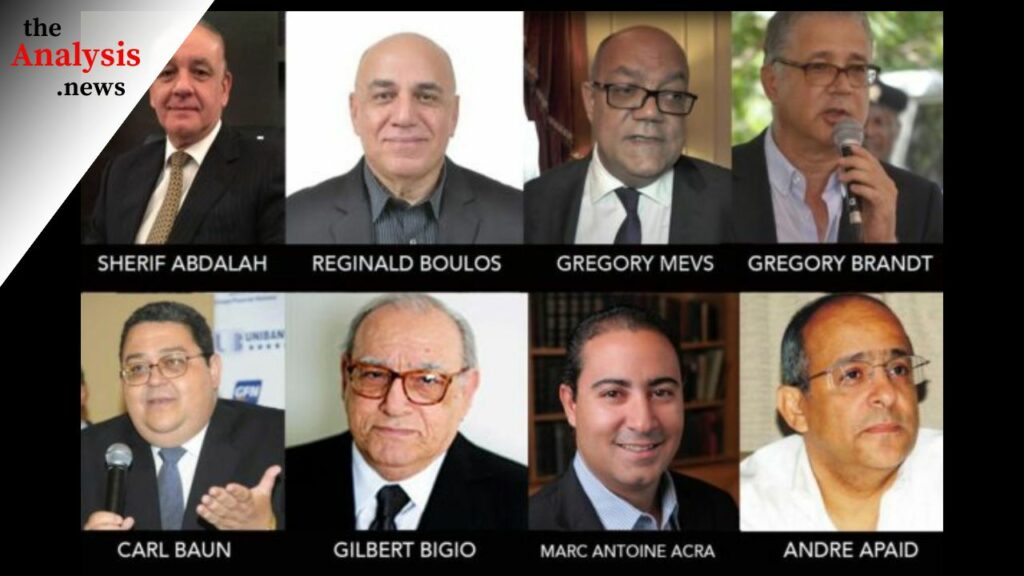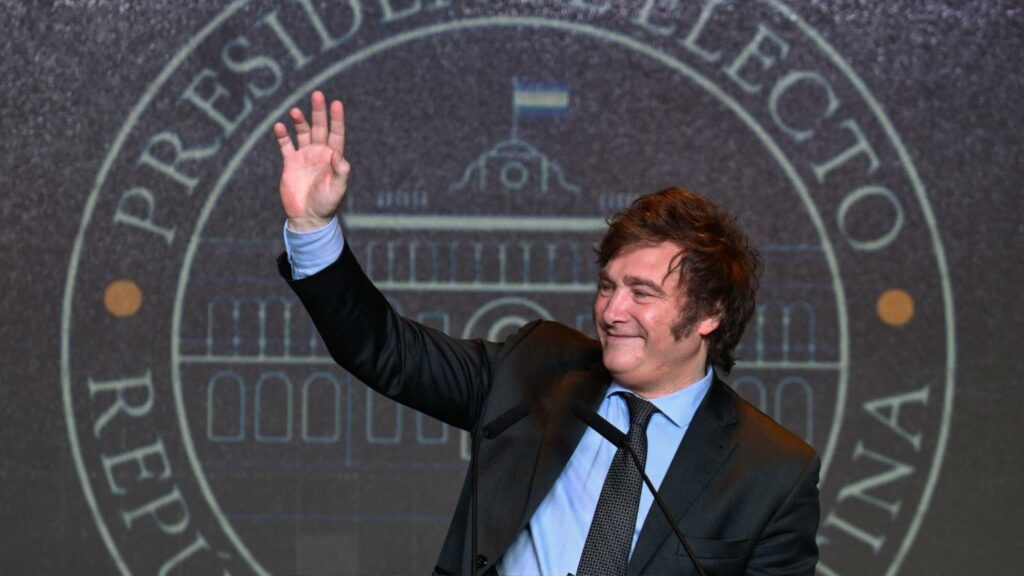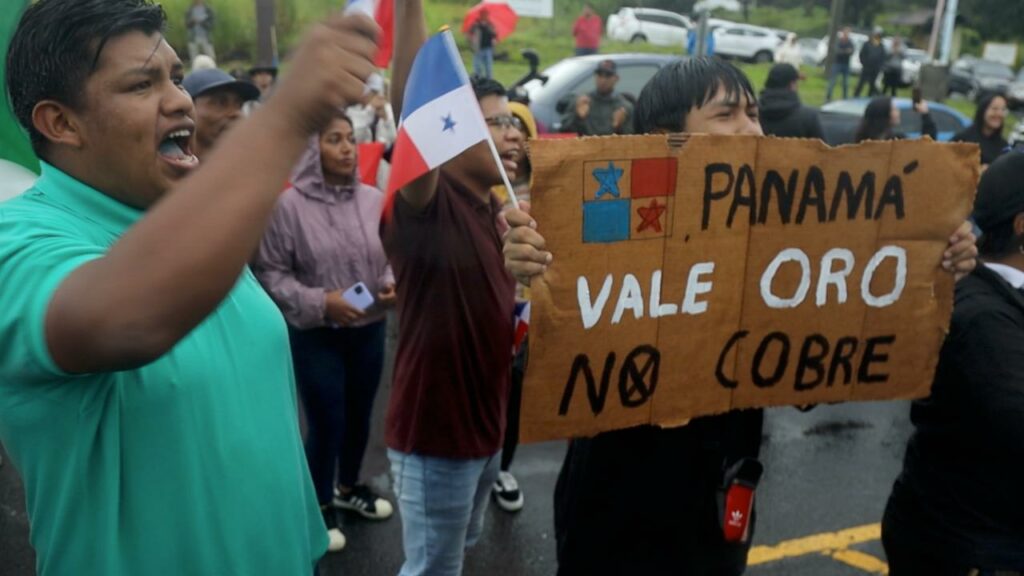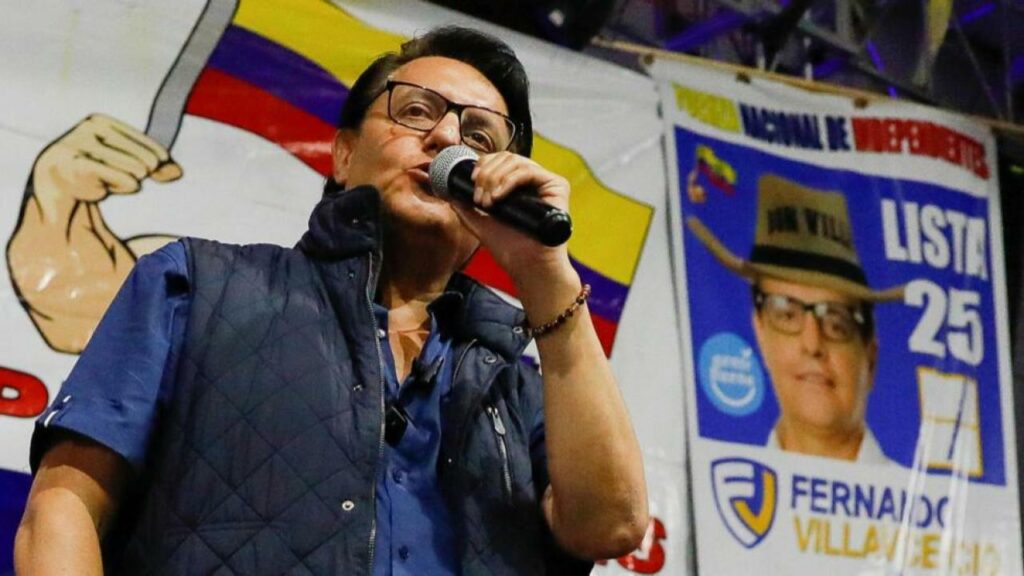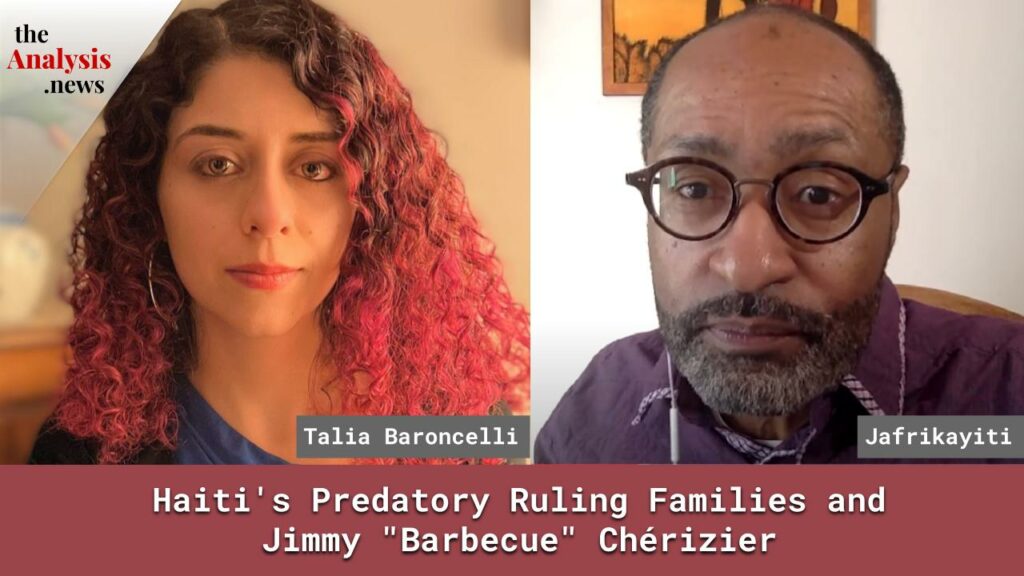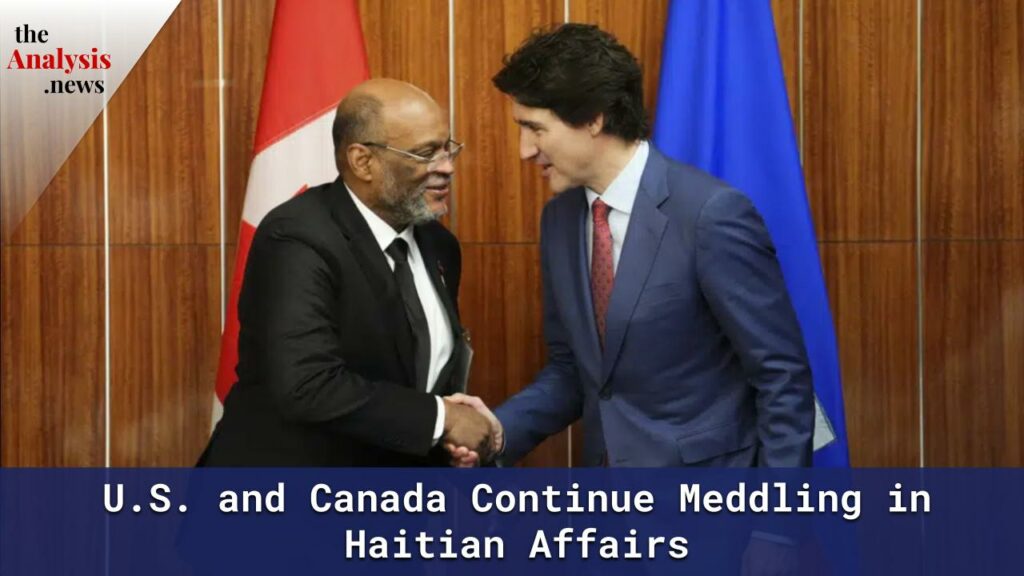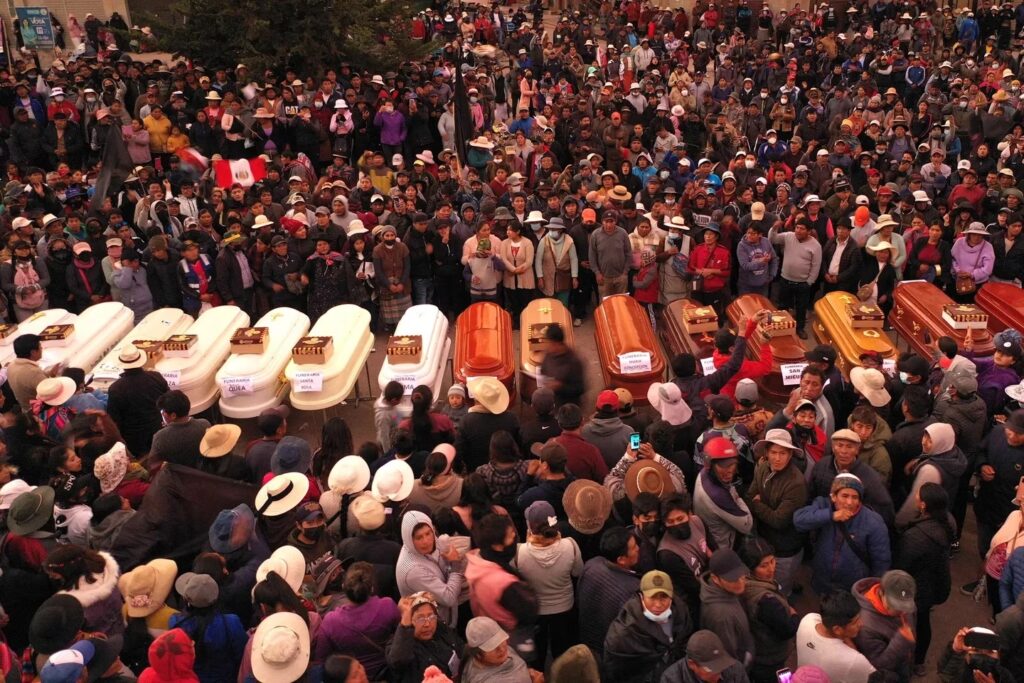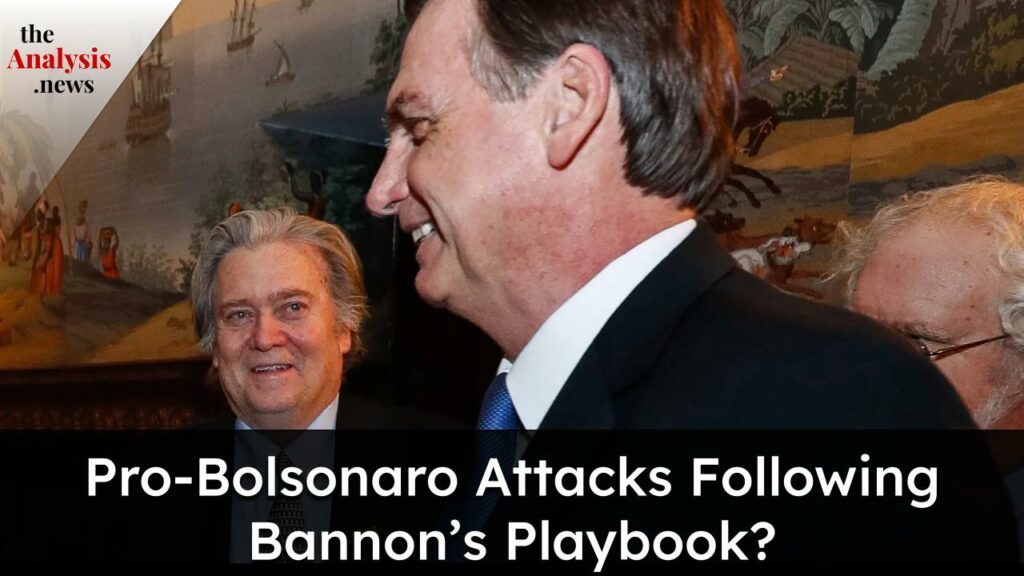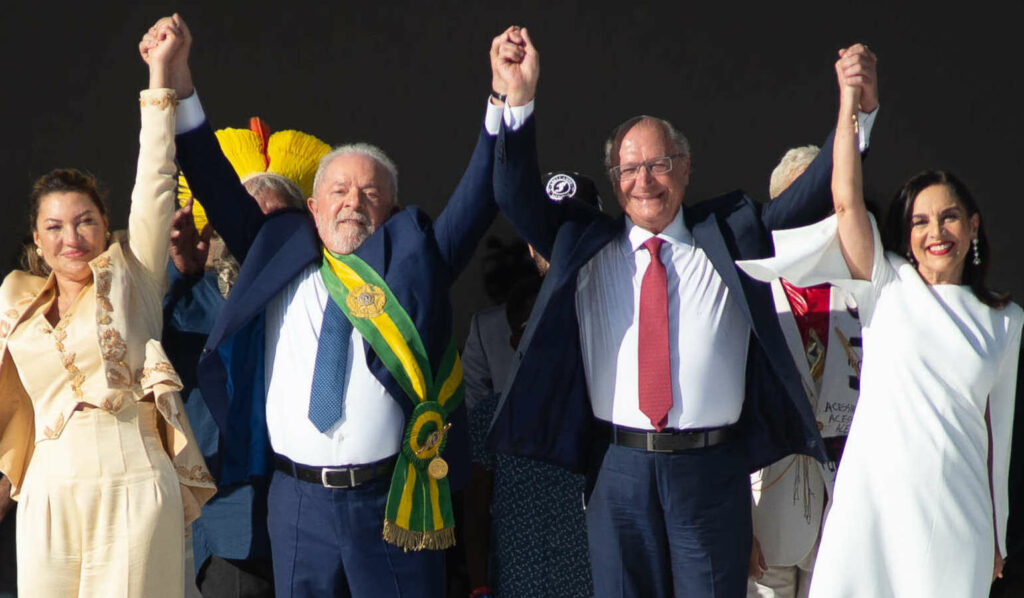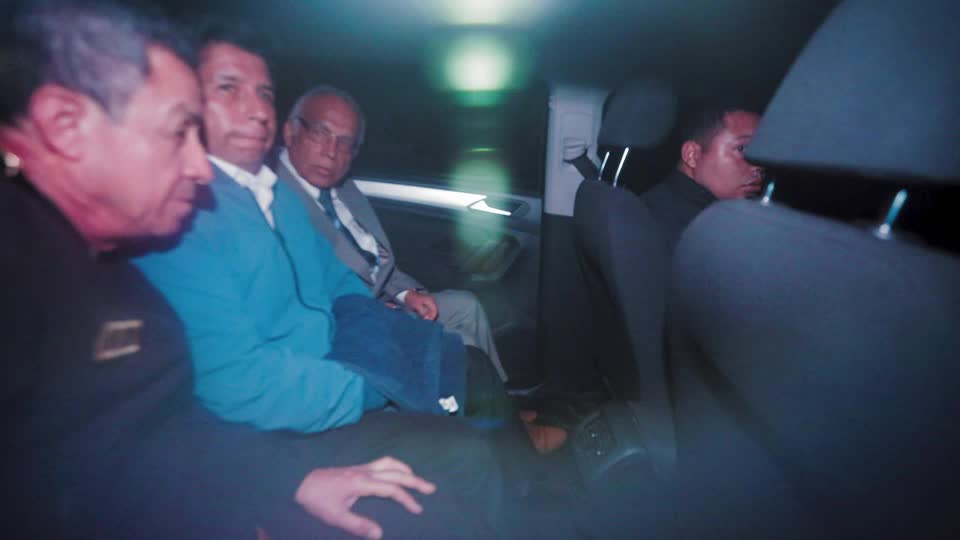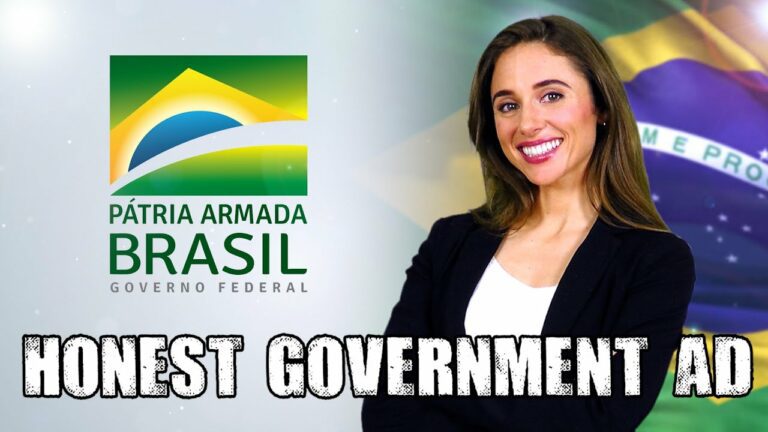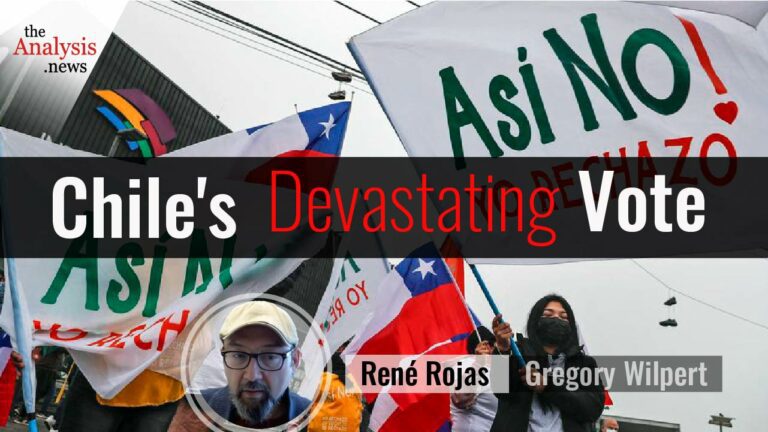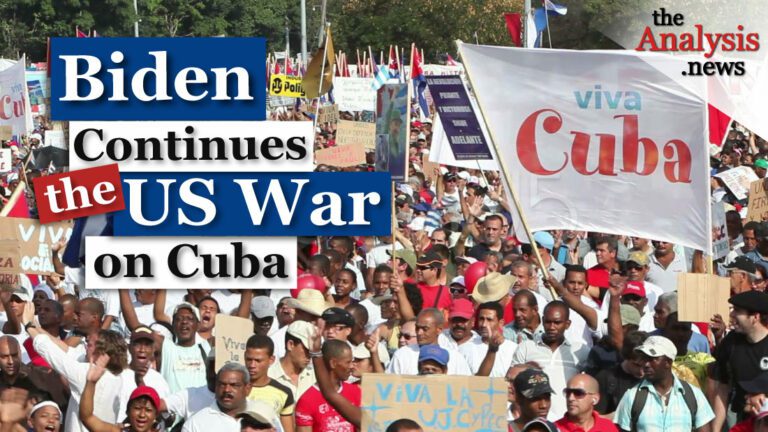Gabriel Boric was elected president of Chile on December 20th – probably the most leftist president Chile has elected since Salvador Allende in 1970. Boric promised that while Chile was neoliberalism’s birthplace under Dictator Pinochet, it will now be neoliberalism’s burial place as well. Patricio Zamorano, a Chilean political analyst and director of the Council on Hemispheric Affairs (COHA.org) talks about what we can expect from a Boric presidency.
TRANSCRIPT
Greg Wilpert
Welcome to theAnalysis.news. I’m Greg Wilpert. It looks like the so-called second pink tide in Latin America is continuing. On December 20th, Chileans elected a leftist and former student leader Gabriel Boric, as its President. Boric, at 35 years of age, will be the country’s youngest and possibly most leftist President since Salvador Allende’s election 51 years ago in 1970.
Boric won the election with 56% of the vote, about twelve percentage points ahead of José Antonio Kast, a candidate of the far-right whose brother was an advisor to former dictator Augusto Pinochet.
What does Boric’s victory mean for Chile and for the region? Joining me to look at those and other questions is Patricio Zamorano. He is a Chilean political analyst and the Director of the Council on Hemispheric Affairs, Coha.Org, which is based in Washington, DC. Thanks for joining me today, Patricio.
Patricio Zamorano
It is a real pleasure, Greg. Thank you.
Greg Wilpert
Let’s start with the campaign and the election result. Following the first round of the election on November 21st, right-wing candidate José Antonio Kast was slightly ahead with 28% of the vote compared to Boric’s 26%. Now, the race for the second round looked very tight, but then Boric won with a very solid twelve percentage point advantage. What happened?
Patricio Zamorano
Sure, there are a couple of things that actually happened there. First of all, we have, in Chile, still a very hardcore right-wing vote. We have always had 25% to 30% of the vote, and there’s no doubt that there are still people who like the legacy of Augusto Pinochet. We have that. That said, all polls were absolutely wrong, except a couple of them. Myself also, I believed in those polls because in Chile, polls, in general, tend to be okay, technically. But in this case, they made a huge mistake.
The post-analysis of the situation demonstrates that basically, half a million new voters came to the polls, most of them young people that were mobilized after the victory of Kast in the first round. So that’s why we have this huge difference because just before the election, the polls were tied, basically. It was a technical tie, 50/50. The outcome of the election was not clear at all. So it was a surprise for me. It was a surprise for the whole country, the huge difference of almost twelve points between both candidates.
So that’s a little bit of the explanation. And we will find out more as the weeks pass.
Greg Wilpert
Before we get to Boric and his platform and what he plans to do, let’s take a quick look at Kast, the man he defeated. Now, who is Kast? What did he stand for? And who did he represent?
Patricio Zamorano
Well, Kast is a Congressman who represents Pinochetism. Basically, it’s the legacy of Augusto Pinochet, amplified by the fact that he’s absolutely out of touch with the reality of the world. We have certain values now that, little by little, are becoming a standard for societies. We believe in social protection, we believe in the rights of women, we believe in the rights of the LGTBQ+ community. We believe in certain things that are becoming standard in theory on paper. But Kast actually ran on a platform that was against these values.
He was extremely conservative, representing the far-right. Almost fascism in a certain way because he declared that he was going to use secret jails. Basically, he was saying that we would detain people in special jails to fight crime, making us remember all the secret police under Augusto Pinochet. Basically, he was not shy of new policies against immigrants. His economic platform was extremely conservative.
He was actually against the new wave of reform that 80% of Chileans wanted—for example, a new Constitution. We have to remember that almost 80% of the population, in a referendum, declared that they wanted to have a new Constitution written to replace the Pinochet Constitution. And Kast was against that as well.
He was against the reform in the pension system, against benefits from the state and the government in general. So Kast was really against these current new progressive advancements. So the Chilean people decided that they didn’t want to try that again.
We have to remember that we have a neo-liberal system in Chile. All the fundamental aspects of society were privatized under the dictatorship. The pension system was privatized, the health system was privatized, the education system was privatized. So Kast was really trying to enforce the model that fell, and that nobody likes. A model that has caused a lot of damage to Chileans in the last 40 years.
Greg Wilpert
Now I’m wondering what happened in the sense of— the media mostly presented this as a contest between the far-left and the far-right. Now, leaving aside the question about just how far-left Boric is, it definitely seems to have been an election where the center-left and the center-right have completely vanished from the scene, it seems.
Now, if you think about [Miguel Juan Sebastián] Piñera, I guess he was a right-wing candidate, but he was a right-wing President, Piñera. But Kast was to the right of him, and Boric is certainly to the left of the previous center-left presidents.
So what happened to the center-left and the center-right, which had been governing Chile since the defeat of Augusto Pinochet?
Patricio Zamorano
Sure, I believe that the answer is very clear. I’m part of that generation. Also, in the ’90s, the center-left and the center-right basically negotiated with the Pinochet legacy, and they compromised. They created or accepted the most fundamental aspects of this neo-liberal and authoritarian model. And they continue managing the same institutional and economic framework that was delivered by the Constitution of 1980. So in that process, they sold their soul to the legacy of Augusto Pinochet. And a lot of people like me, we don’t like that.
We believe that the dictatorship has to be wiped out from Chilean democracy. We believe that the system was extremely unequal. It was not inclusive. It was very conservative in bad terms, and it created a lot of damage to the social framework of the country. We have to remember that Chile is top ten among the most unequal countries in the world, where rich people are extremely rich and poor people are very poor. And that was the model that the center-right and the center-left agreed to preserve.
So that’s why Boric, when he emerges from a whole history of mobilization, because he himself was a student leader his whole life. So it’s no coincidence that he’s actually leading the way because those students from high schools, from middle schools in Chile, from universities, they were against this model way before all this new wave of social unrest. So that’s why Boris actually is very critical of the central-left. He’s very critical of the Socialist Party, which in theory is the party of Salvador Allende.
But the Socialist party is not the same party. It’s more the Social Democrats party now. Very critical of the Christian Democrats as well. All those parties that negotiated with the legacy of Augusto Pinochet and the Chilean society were very clear. I think in saying that we want to break from that system because that system of the center is just not working for us.
So the buying power of Chileans based on salaries is extremely low. Chileans are really suffering from social depression in so many aspects. When you have a system where the health system, the education, and the pensions are privatized, meaning that means that you get good benefits or good quality of life based on your income. We have to remember more than 50% of Chileans make less than $500 a month, and almost 70% make less than $700 a month. So it’s extremely unequal. The situation of families is very tight. So, of course, I think it’s very obvious what happened in the last two years based on that trauma. It’s a social trauma that Chileans have suffered in the last 40 years after the dictatorship in terms of economic terms and social terms.
Greg Wilpert
Well, let’s turn to, more specifically, what we might be able to expect from Gabriel Boric. You already talked about his background, but how would he be different from, let’s say, the two terms of Michelle Bachelet, who also was a center-left President who did not do much to change this economic or political system. In what ways do you think Boric will be different?
Patricio Zamorano
It’s going to be different because of the context. Boric is going to be the institutional manager of a new Constitution. We have to remember that we have a constitutional assembly working. We have 155 deputies elected by the people working, writing a new Constitution, and the basis of that Constitution matches the government program and the governance program of Boric.
So we are talking about eliminating the rules of the market throughout all these social aspects of any society: education, health, pensions, labour rights, women’s rights, Indigenous rights. All these elements that are modern. Now that everybody agrees, that’s going to be part of the new Constitution. So Boris has a huge responsibility here. It’s not easy because he only has four years. We have to remember that, unfortunately, Chilean law gives a new President only four years. He or she can’t be reelected after another term. So it’s non-consecutive. So that’s exactly what happened with Bachelet and Piñera. And the huge difference this time is that Boric is resting on a platform of change, real change.
Michelle Bachelet was more like a progressive candidate. She did a very good job in certain aspects, but she never really delivered reforming the private health system or the educational system. We had some progress, but it was very minor. So now Boris is really the progressive candidate who has a huge responsibility. In four years, he needs to deliver a new contract between the Chilean state and the Chileans; that’s a huge challenge. There is no doubt about that.
Greg Wilpert
Is there a timeline set for the new Constitution? I mean, when might it be approved?
Patricio Zamorano
Sure, it was formed between June and July. The new assembly has nine months minimum to work. That’s going to be April, but it could be expanded to 12 months. So we may have a new Constitution by May or June 2022. After that, we’re going to organize a new referendum, and the Chileans will decide in a Democratic election if they accept or not the new Constitution. The good thing though, is the fact that Boric will be the one who is going to sign this new Constitution, which is very great.
Greg Wilpert
And it also seems important to note that the majority of the representatives to the constitutional Convention are of progressive groupings. Isn’t that correct?
Patricio Zamorano
Yes, they got more than 70% of the seats. That was another victory of the expectations of the people. That’s why these polls were very misleading because we couldn’t believe; we meaning analysts, couldn’t believe. How is that possible if 80% of the population agree with a new Constitution and then the deputies elected more than 70%, which is the absolute majority for a lot of very deep changes.
Basically, it’s the supermajority that the center-left got there. So they’re not going to have the right-wing parties boycotting this progress. How is that possible? How was it possible that the elections of the President were just tied 50/50. So that’s why it was great to see the actual reality of things. Most of the people, twelve points of difference, want change.
So, in that case, Boric will have that advantage, at least some peace of mind.
Although I have to clarify, though, Greg, it’s very important for people who are watching us that they understand that Boric got a lot. But still, his sector, the center-left doesn’t have enough votes in Congress. In Congress, in both the Senate and the law House, in both Congress, Boric doesn’t have more than 50%. That means he must negotiate with the right-wing parties. And that’s going to be an extra challenge in terms of the legislation. And that’s a challenge that we should be very clear about because that’s going to compromise a little bit of the rhythm of reforms that Boris is going to try to make.
Greg Wilpert
That’s actually what I was going to get into next. Just how likely it is that Boric will be able to carry out his program because he clearly has a mandate with such an overwhelming majority and also given the constitutional Convention and the way it’s composed. But then, like you said, the legislature, he doesn’t have control over that.
But then there’s also another factor that I want to bring up, which is, of course, the legacy and the remaining power of the Right in Chilean, more in general, in its institutions and in society. After all, Pinochet created a system that was supposed to protect basically the right-wing kind of model that he had set up. And I’m just wondering what possibilities will voters have to overcome those aspects?
If you look at, for example, other countries where there have been efforts to introduce very progressive change, particularly, there was a coup in Honduras. Then there was a coup in Bolivia, and then a legislative coup in Brazil. Will Boric face similar obstacles, as let’s say, in Brazil or Paraguay, where there was also a legislative coup against Fernando Lugo back in 2012.
So do you think that he’ll be able to overcome this kind of opposition? What do you think?
Patricio Zamorano
Yeah, we don’t have those conditions in Chile. I think the context is very clear. He has a very strong mandate. There’s absolutely no doubt that’s why Kast considered the victory of Boric very early: 5:00 p.m., 5:30 p.m., Washington Time 7:00 p.m. In Chile, just 1 hour, after all the polls were closed, just with 10% of the votes counted, the difference was so huge that Kast immediately accepted his failure to become the new President of Chile.
I’m saying that because from that point on, it’s very clear that Boric has a strong mandate. Even though he doesn’t control Congress, at least the new Constitution will create a new framework. So even though he doesn’t have more than 50% of both Congress, at least the new Constitution will impose a new contract. So it’s going to be a contract where the rules of the market are not going to be applied to health, to education, to pensions, and to labour rights, et cetera.
So that’s a good start, but there is absolutely no doubt that the right-wing parties are going to do whatever they can to hold any level of power because they lost the referendum and they lost the deputy elections of those people who are going to write the new Constitution. They lost the presidency, and now they don’t want to lose their power in Congress, so they are going to do whatever they can to stop Boric. There’s no doubt about that.
We have to remember that those parties are still strong. That sector controls big sectors of the economy of Chile: the financial system, the media. We have a huge concentration of right-wing media outlets in Chile. There’s a very difficult way to express different views.
So there’s no doubt, Greg, that these political parties are going to fight back as much as they can because they are on the defensive now. They cannot believe what happened, especially with the symbolic fact and real fact that the Communist Party, for example, is part of the coalition. It’s part of the coalition of Boric. So, 40 years later, after Pinochet tried to exterminate human beings, militants of the Communist Party, now the Communist Party comes back to power through Democratic means, being elected, being part of a government, a new government, or offering a new way of governance. And that’s a huge thing also that I want to mention.
Greg Wilpert
But that also raises the question of what’s the role of the military? I mean, after all, Pinochet was a General. Do you think the military will have any role to play in the negative sense?
Patricio Zamorano
We’ll see. So far, the military, since the last decades, has been very quiet. They really have the new generation. You can feel that they don’t like the cost for the armed forces of Chile. The model cost that was imposed by the legacy of Augusto Pinochet, they don’t like that. But at the same time, we still have a body of people who are very conservative, and that’s why it’s very important, all these processes. The Pinochet dictatorship, through the Constitution, imposed a role for the armed forces. The armed forces, on paper, were the ones who were authorized to intervene in the Democratic system. They believed that the security of the country was being affected. And in a language that meant everything from the country being governed by the Communist or any identification. They have the right to identify terrorism in any group of Chile. It’s exactly what’s going on now with the Indigenous Mapuche people from Chile who are being called terrorists based on the 1980 Constitution. And then the armed forces and the police exercise huge repression against them. So those things need to change at some point.
So all this movement, all this progress is actually made in a way that the enforcers shouldn’t intervene anymore. I think there’s no political conditions for that now. The police, actually, it’s the opposite. The police of Chile Carabineros [Carabineros de Chile]. That’s the actual name of our police forces. They need to be reformed. They’re highly repressive. They have harmed a lot of people within the last two years. We have to remember this came before Boric, the social unrest and the movement of progress for a new Constitution. It’s been around for at least four years. So in that process, Piñera actually used the police against the people.
We had people without eyes. They lost their eyes because of rubber bullets. Police again used dogs, accusations of rape. So the police have very low legitimacy right now, and the military knows that. So I don’t see conditions for intervention, but of course, we know that Pinochet still has a big level of influence. Still, Kast almost 30% of the vote in the first round. So we really need to pay attention. So we don’t make the same mistakes from the past, and the Chilean democracy survives.
Greg Wilpert
Finally, I want to turn to the international context. Boric has been welcomed by many center-left leaders in the region, such as by [Luiz Inácio] Lula da Silva in Brazil, Gustavo Petro in Colombia and then the President, Andrés Manuel López Obrador of Mexico, [Alberto] Fernández in Argentina. But leaders of Cuba, Nicaragua, and Venezuela have been much more reluctant to praise his victory because Boric has at times criticized these governments.
What do you think this will mean for the Left in Latin America, that is, the Left governments, because the majority of them are now governed by Left or center-left presidents?
Patricio Zamorano
That’s why I don’t necessarily agree with the pink tide theory regarding Boric and others because it’s not really there. Boric doesn’t belong to the Bolivarian region or to the Bolivarian movement. Even though the Communist Party will be part of the coalition, in that sense, the Communist Party will be the one putting pressure on Boric to have a constructive view of; what did you mention? Venezuela, Cuba, Nicaragua, Bolivia, even. Honduras also, I think I would include Honduras and Xiomara Castro into the Bolivarian spirit. The rest of the governments are more on the Social Democrat range of the political spectrum. In that sense, Boric will be more comfortable with those governments, with Argentina, maybe with Mexico and others. So Pedro Castillo, also in Peru, is not 100% clear how Bolivarian he is because he’s getting a lot of pressure from the conservative sectors of Peru, very similar.
So in that sense, we have to be very clear that Boric, in that sense, in terms of social values and economic aspects, is very progressive to the Left of the Left. In terms of foreign policy, I would say he will be very center. We shouldn’t be surprised if he even says something against Nicolas Maduro’s government in Venezuela, or even Cuba, or even Nicaragua. So we have that contradiction there, but it’s very important to be very pragmatic about that because Boric is a pragmatic person in that sense.
He named, for example, Salvador Allende in some of the discussions on TV against Kast. But he also named [Eduardo] Frei, which is a Christian Democrat, as one of his favourite presidents. So that shows you a little bit that Boric, in a certain way, is going to try to invite more Chileans to his project. And I think it’s very smart because we have to remember that 80% of the population who accepted a new Constitution, some of them are conservative. So we have conservative Chileans who also understand that the country goes first, and they’re willing to rewrite a Constitution that they perceive is not working.
So Boric, as a President, he needs to respond to certain sectors that are not necessarily represented by the center-left. So in that sense, in terms of foreign policy, I could anticipate, I could speculate that Boric will be on the center a little bit.
Greg Wilpert
Now, I think that’s interesting, especially because with regard to relations between Chile and the United States. The two strategies that governments in Latin America have been choosing between have either been greater regional integration, during the first so-called pink tide when UNASUR was created (the Union of South American Countries) and then also CELAC [Community of Latin American and Caribbean States]. And these were created during the height of, particularly under the leadership, I would say, of Hugo Chávez.
But since then, those institutions have kind of fallen apart. And then various countries, especially the right-wing countries, have tried to ally themselves again with the United States. So that seems to be kind of the tendency either to unite or to ally with the United States.
Now, if that’s the choice, what policy or direction do you think Boric will choose regarding U.S. Chile relations?
Patricio Zamorano
I am under the impression that he’s going to diversify. Even Piñera has been extremely pragmatic. Piñera government has a very good relationship with China and with Europe in general. I can anticipate that Boric will be part of that wave of connections. Latin America is not only Boric is not only Chile, I think Latin American general has diversified its connection with the global market. There is no doubt about that.
The U.S. is not what the U.S. used to be, it’s not. Now, loans are coming from China for new projects of development. China is helping with the transfer of technology. Russia is actually getting very good connections through several countries of Latin America. Europe, in general, has a very strong financial network with Latin America. We now have a new wave of integration from South to South, basically Latin America with Africa and South Asia.
So we really have a new world that has been built for the last 20 years. So Boric, I think, will be pragmatic on that. I think he’s going to continue with whatever helps his agenda, whatever helps. If it’s going to be China, it’s going to be China. If it’s going to be the U.S., it’s going to be the U.S.. If it’s going to be Europe, it’s going to be Europe. So I think in that sense, he will be part of that.
And I think CELAC is getting stronger, I think, little by little. The OAS [Organization of American States] is losing a lot of power these days. We have to remember, Luis Almagro, the Secretary-General of the OAS, Organization of American States, has been highly criticized by several governments and by several presidents. He’s very polemic in his way of supporting just unilaterally the U.S. policies, which is actually against the spirit of the OAS.
The OAS should be a forum for discussion, for debate, for conversation, and for the protection of democracy in any country. So Luis Almagro has played a very poor role in terms of those values. So I would say that maybe Boric will be more supportive of the CELAC than the OAS in the short term. But we will see how that international arena is going to work in the next month. I believe it’s not going to be a priority for Boric.
Boric has a huge domestic challenge. I’m not sure if it’s feasible to do it in four years, so I can anticipate that Boric is not going to pay a lot of attention to the international arena, at least during the first year. The country needs help urgently. We need to reform very fundamental aspects of the Chilean society in such a short period of time, so that’s going to be his priority internally.
Greg Wilpert
Okay, well, it’s definitely going to be very interesting. I’m definitely going to follow up with you once we see how the Constitution shapes up, but we’re going to leave it there for now. I was speaking to Patricio Zamorano, Chilean political analyst and Director of the Council of Hemispheric Affairs in Washington, DC.
Thanks again, Patricio, for having joined me today.
Patricio Zamorano
Thank you, Greg, for the invitation.
Greg Wilpert
And thank you to our listeners and viewers for tuning into theAnalysis.news. If you like our videos and podcasts, please make sure you visit theAnalysis.news website and make a donation there so we can continue to provide the service. Also, don’t forget to subscribe to our YouTube channel and to our podcast.
END



